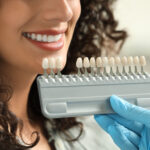“Body art” in the form of piercings continue to be popular. As oral piercings become more commonplace, complications from wearing them are more readily seen in dental practice. The Placerville Dental Group therefore wants to provide information for our patients and their families so they can make informed decisions about whether or not oral piercings are a good idea for them.
Is There a Problem?
What’s wrong with a tiny bit of metal in your mouth? The problem is that the millions of bacteria don’t give you any style points for being cool. Bacteria is just interested in dark, damp places to breed and then wreak havoc, and oral piercings provide the perfect opening. Tongue and lip piercings thus may cause extreme swelling and infection. And if you accidentally bite too hard on your “bling,” the result can be broken teeth. Finally, experience shows that most people cannot help fidgeting with their piercing, clicking or dragging against their teeth and gums. This invariably leads to gum recession and abnormal wear on the tooth enamel.
Make an Informed Decision
At the Placerville Dental Group we don’t judge, we just want what’s best for your teeth! If you have oral piercings, don’t hesitate to come in for your regular dental exams and cleanings. The piercing needs to be removed to do our work, however, as getting high-speed dental tools mixed up with jewelry can be a painful experience. In addition, we want you to keep in mind these potential complications with oral piercings, listed by the American Dental Association:
Infection, Pain and Swelling
As we mentioned earlier, bacteria readily multiply in your mouth. Piercings make it easy to reach to the blood stream and cause infection. Mix this potential with the wrong bacteria and your circumstances can quickly become life threatening if not treated promptly. In other extreme cases, it’s also possible for a piercing to cause your tongue to swell and block your airway, leading to choking.
Damage to Gums and Teeth
The common habit of biting or playing with the piercing can injure your gums and lead to cracked, broken or sensitive teeth. It’s also common for piercings to damage fillings and increase the chance you would need a root canal procedure.
Allergic Reactions
Unexpected hypersensitivity to metals at the pierced area are possible, leading to the aforementioned swelling.
Nerve Damage
After a piercing, some experience a numb tongue that is caused by nerve damage. This condition may be temporary, but sometimes is permanent. This may affect your sense of taste, how you speak or your ability to eat.
Drooling
Pierced tongues increase saliva production in some patients. so much so that they start to unavoidably drool. That definitely reduces the “hip” power of this form of body art.
If you still decide to get a tongue or lip piercing, you definitely need to be aware of these side effects. In addition, you should keep in mind steps that minimize the risks. Our next blog article will therefore discuss how you can reduce the chance of complications with oral piercings.



0 Comments